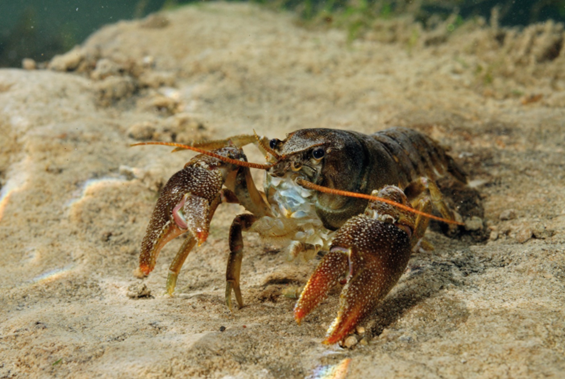#57 White-clawed Crayfish by Vicki Bartlett
Meet Vicki Bartlett, Rivers and Wetlands trainee at Yorkshire Wildlife Trust!
Vicki Bartlett is the Rivers and Wetlands trainee at the Yorkshire Wildlife Trust (YWT), who works closely with Vanessa Barlow, YWT’s Crayfish Stakeholder Officer. Vicki has always been passionate about wildlife and developed an interest in crayfish when she accidently came across one hiding under a rock while wild swimming with her 3 children at Burnsall in the Yorkshire Dales National Park. Since joining the team, her interest and knowledge of the White-clawed Crayfish has grown, along with her commitment to do what she can to help protect them.
White-clawed Crayfish - Peter Cairns
Unsurprisingly, Vicki’s chosen species is the White-clawed Crayfish Austropotamobius pallipes, the only native species of freshwater crayfish in the UK and our largest freshwater invertebrate. They have suffered a large population decline in recent years, due to many factors including the introduction of Signal Crayfish Pacifastacus leniusculus into river ecosystems and poor biosecurity. They are a UK Protected Species and are incredibly important for river ecosystems. Acting as a key-stone species, they aid in the breakdown of biological matter (like leaf litter), feeding on algae and macrophytes, and provide an important food source for animals such as otter, fish species, insect larvae, newts, and water voles. They live in freshwater streams and rivers, as well as still waterbodies such as reservoirs. They hide from predators underneath stones and rocks and in small crevices during the day, and then come out to forage for food at night.
North Yorkshire is a stronghold for the endangered White-clawed Crayfish, but the population is under threat and could disappear completely if no action is taken. The main threat they face is from Signal Crayfish, an Invasive Non-Native Species (INNS), which is larger, more aggressive and can produce young at a faster rate. Not only that but Signal Crayfish also carry crayfish plague (a type of water mould) deadly to White-clawed Crayfish but not to Signal Crayfish. One way to help buffer our native crayfish from this threat is by setting up ‘Ark Sites’ for them. An Ark Site is an isolated, self-contained, refuge site with running water, still water, or both, where new populations can be established, safe from non-native crayfish and crayfish plague. These sites must have suitable water quality and appropriate habitat, but once set up they can support a healthy, self-sustaining population of White-clawed Crayfish with little need for ongoing management.
In 2019 the Yorkshire Wildlife Trust realised that more could be done for our white-clawed crayfish populations if they collaborated with other organisations doing similar work. Thus, the North Yorkshire Crayfish Forum was established, hosted by Yorkshire Wildlife Trust, to collaborate and coordinate efforts across the county, drawing together organisations passionate about protecting our native stronghold.
Four years on, the forum now has over 40 members from 22 different organisations including environmental charities and national parks, government agencies, local councils, and private businesses. The forum meets at least three times a year to discuss information and progress on key common work areas. This facilitates the coordination of crayfish efforts across the county, promoting communication, collaboration, and partnership development.
The forum has produced a Crayfish Strategy, stating its aims and objectives to achieve their vision of protecting North Yorkshire’s White-clawed Crayfish, and a 5-year delivery plan (2022-2027) which details actions and projects to achieve their objectives in the strategy. They have also produced a map to show where White-clawed Crayfish are most at threat in North Yorkshire and other resources such as a guide for land managers.
An example of this partnership at work is Natural England’s Species Recovery Programme funded project, Claws for Thought: saving North Yorkshire's native crayfish, which started in August 2023 and runs until March 2025. In this project the Yorkshire Wildlife Trust, the Yorkshire Dales Rivers Trust, and Flamingo Land, together with the support from all members of the North Yorkshire Crayfish Forum, are creating new crayfish ark sites, enhancing existing ark sites, and establishing a captive rearing facility (to help bolster populations and support the ark sites).
Recording and monitoring
Recording and Monitoring is an important part of the Forum’s work. Yorkshire Wildlife Trust’s Crayfish Stakeholder Officer, Vanessa Barlow, has trained 20 volunteers in crayfish identification, surveying, measurement and in strict biosecurity measures. These include thorough clean down and disinfection of equipment and footwear, to prevent cross contamination of sites by following the Check, Clean, Dry guidelines (a partnership campaign set up to improve aquatic biosecurity in the UK).
The volunteers’ monitoring survey results are sent to the North Yorkshire Crayfish Forum and local ecological record centres, where they are used inform current and future work. As White-clawed Crayfish are protected under the Wildlife and Countryside Act 1981, a Natural England license is required to survey and handle them.
If the public find or accidently catch a crayfish (alive or dead) they are asked not to disturb it, to leave it where they have found it, and report it to the Environment Agency (Incident hotline - 0800 80 70 60).
Twitter: @NYCrayfishForum
Website: https://www.ywt.org.uk/north-yorkshire-crayfish-forum
Further information and acknowledgements
NEYEDC would like to thank Vicki for her time and expertise in helping to create this blog.


